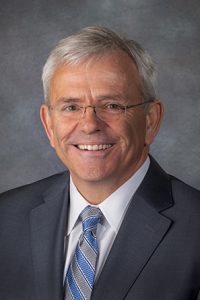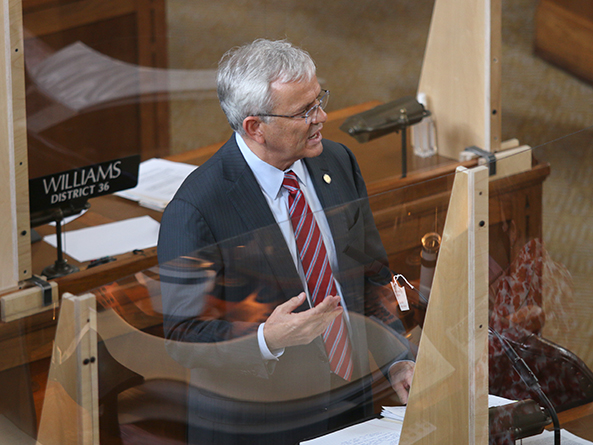Increased law enforcement standards advanced
Lawmakers gave first-round approval April 21 to a bill that would increase certification and training standards for Nebraska law enforcement officers.

Under LB51, sponsored by Omaha Sen. Steve Lathrop, the current 20 hours of annual continuing education required of all officers would increase to 28 hours in 2022, and 32 hours in 2023 and subsequent years.
Lathrop said that the Judiciary Committee held listening sessions last summer to hear from constituents frustrated with policing in their communities. LB51 is the result of those concerns combined with input from local law enforcement who are invested in higher standards, he said.
“Not every [law enforcement] agency is comfortable with reform, but the majority of testifiers recognized that improving the professionalism of law enforcement is in everyone’s interest,” he said.
A Judiciary Committee amendment, adopted 41-0, became the bill.
As amended, LB51 would require a psychological evaluation of any applicant who has not worked previously in law enforcement to determine fitness for duty. Applicants seeking entry-level law enforcement certification would be required to complete de-escalation training related to mental health behaviors, substance abuse, anti-bias, implicit bias and crisis communication.
An applicant seeking certification as a law enforcement officer would be required to testify under oath that their certification has never been revoked or suspended in another jurisdiction and they have not been separated from employment or disciplined for serious misconduct or a violation of their oath of office, code of ethics or statutory duties.
Additionally, they must attest to the fact that they have never been convicted of, or pleaded guilty or no contest to, a:
• state or federal felony offense;
• misdemeanor crime of domestic violence; or
• state or federal misdemeanor offense if the violation reasonably could be connected to their fitness to serve.
Omaha Sen. Terrell McKinney spoke in support of LB51. Not every Nebraska community is over-policed, he said, but North Omaha is and that is why the bill’s protections are necessary.
“We talk about public safety, but what about the public when they have to deal with rogue officers who don’t care about them and would do anything they can to oppress them?” McKinney said.
Sen. Mike Groene of North Platte said he worried that the increased continuing education requirements would keep officers from working in their communities for nearly one week every year. But Lathrop noted that the bill would remove a current cap on the amount of training an officer may complete online.
LB51 also would authorize the appointment of noncertified conditional officers, pending acceptance into a formal law enforcement training program. These officers would be required to discharge their duties under the direct supervision of a field training officer and be restricted from wearing a badge, carrying a firearm or interacting with the public until completion of their training.
Norfolk Sen. Michael Flood offered an amendment, adopted 36-0, that would allow a noncertified conditional officer to wear a badge while on duty. If a law enforcement officer is invested with arrest authority and the ability to carry a firearm, Flood said, they should wear an official badge.
“I think this will lead to less confusion for a motorist or somebody that comes into contact with one of these individuals … that they are acting under the color of the law,” he said.
A noncertified conditional officer could, only with direct supervision and guidance from a training officer, ride in a marked police cruiser, make arrests, interview suspects, victims or witnesses or carry out other law enforcement functions. LB51 would place a 16-week restriction on a noncertified conditional officer’s service.
Sen. Tom Brewer of Gordon expressed concern that the creation of a noncertified conditional officer designation would eliminate the use of reserve officers in rural areas of the state.
Reserve officers function in much the same way as a volunteer fire department, he said, and can relieve the strain on less populated counties that may have just one sheriff serving all residents. Brewer said he would work with Lathrop on a compromise amendment to allow both the noncertified conditional officer and reserve officer programs to function simultaneously.
Provisions of LB601, originally sponsored by McKinney, also are included in the amended LB51.
Those provisions would require the Nebraska Commission on Law Enforcement and Criminal Justice to post on its public website, by July 1, 2022, a list of all law enforcement officers who have — on or before Jan. 1, 2021 — voluntarily surrendered their certification or had it revoked, been convicted of or pleaded guilty or no contest to a felony or Class I misdemeanor or been found to have engaged in serious misconduct.
LB51 also would prohibit a police officer from intentionally using a chokehold on a person, except when deadly force has been authorized.
Similarly, an officer would be prohibited from using a carotid restraint control hold — a method of rendering a person unconscious by restricting blood flow by compressing the carotid arteries in the neck — on any person unless the officer believes the person would cause death or bodily injury to others or deadly force has been authorized and the officer in question has been trained on the restraint technique.
Finally, the bill would require the Nebraska Commission on Law Enforcement and Criminal Justice to develop accreditation standards for law enforcement agencies. Beginning Jan. 1, 2023, the commission would publish a list of unaccredited agencies annually. An unaccredited law enforcement agency would be ineligible to receive loans, grant funds or donations from the commission until it achieves accreditation.
Following adoption of the committee amendment, senators voted 39-0 to advance LB51 to select file.


